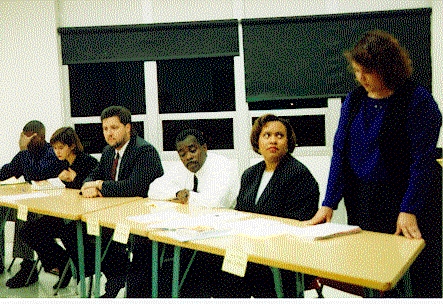

On Thursday, December 7, 1995, at 7 pm, graduate students in Western Kentucky University's Leadership in Student Affairs class held a debate entitled, "Covey vs. Peters: Who Would Make the Better Vice President for Student Affairs?" Approximately 25 faculty, student affairs professionals, and other graduate students from across the region attended the debate, which was held in the College of Education building on Western's main campus. Judges for the debate included Dr. Jerry Wilder, Western Kentucky University's current Vice President for Student Affairs, Dr. Stephen Schnacke, Head of the Department of Educational Leadership at Western, and Howard Bailey, Dean of Student Life at WKU. The debate lasted about an hour.
As part of their course requirements, students enrolled in Leadership in Student Affairs were required to read three books: Effective Leadership in Student Services by Linda M. Clement and Scott T. Rickard, The Seven Habits of Highly Effective People by Stephen Covey, and The Pursuit of Wow! by Tom Peters. They also had to complete a midterm examination in which each student had to decide whether Stephen Covey or Tom Peters would be better as vice president of a "typical" student affairs division. The formal debate on December 7th was the culmination of the class experience.
As many social critics have noted in recent years, higher education seems to be at a crossroads. It is under increasing pressure to define more clearly what its purposes are and how it fits within the greater society. As a critical constituency within the higher education enterprise, student affairs professionals will play a role of ever-increasing importance as higher education moves into the 21st century. Leadership will be critical to the success (or failure) of student affairs professionals to do their part to keep higher education viable and responsive to the needs of both the individual and society at large.
Effective Leadership in Student Services deals with the personal and professional qualities that tend to characterize those who are successful leaders in contemporary student affairs positions. In a very thought-provoking (yet sometime rather dry) manner, Clement and Rickard explain the importance of ongoing professional development and building relationships. They provide concise, practical information regarding how those in positions of influence within the student affairs division are able to accomplish multiple agendas. They also include interviews and examples which serve to further illustrate their primary points. In other words, Effective Leadership gives students a realistic fundamental frame of reference from which to critique Covey and Peters and their potential applications to the student affairs profession.
On the one hand, many are calling for an increased emphasis on moral development within our colleges and universities. Stephen Covey, in his bestseller, The Seven Habits of Highly Effective People, addresses this dimension of what should characterize an "educated" person through his discussion of the "Character Ethic." Indeed, it is appropriate to expect that the college experience, as primarily facilitated via student affairs professionals, should attempt to produce graduates who possess a heightened sense of ethical responsibility and respect for other human beings. Covey feels strongly that many of the problems associated with contemporary "American" culture (whatever that is) are directly related to our failure to properly develop people in a positive way that promotes self-fulfillment through meaningful contributions to others. Undeniably, the college experience can exert a tremendous influence toward achieving that end.
At the same time, Tom Peters' ideas about the importance of placing the customer (students) at the center of the priority structure and therefore stressing the pragmatic aspects of a college education are also seen as being absolutely essential to the survival of higher education in general and student affairs in particular. Peters, as noted in The Pursuit of Wow! (and a host of other influential works) is convinced that the way to insure continued viability is through being as responsive as possible to the individual needs of people. If we offer students something that they need, and they also perceive it as being beneficial, then we have accomplished our primary mission as educators. Moreover, graduates of our colleges and universities must clearly see a connection between the college experience and their ability to gain and maintain occupational fulfillment throughout their lives.
Each debate team had ten minutes to present an opening argument during which they could discuss only their candidate. The moderator then asked each team three questions involving their candidate and specific student affairs applications. Finally, each team had ten minutes to present a closing argument in which they could respond to anything the other team had said about either candidate. At the conclusion of the closing arguments, the judges retired to another room while the students had an opportunity to network with those in attendance.
After a short recess, the judges came back and presented the students with their decision regarding who had done the better job of presenting (and defending) their candidate, and subsequently, who would make the better vice president for student affairs. When it was all said and done, the judges thought that the Stephen Covey team had won the debate, although, in a somewhat surprise move, they indicated that Tom Peters should be selected as the next vice president for institutional development. Everyone in attendance seemed to thoroughly enjoy the debate and there was a sense that learning had taken place.

 |  |  |
 |
 |